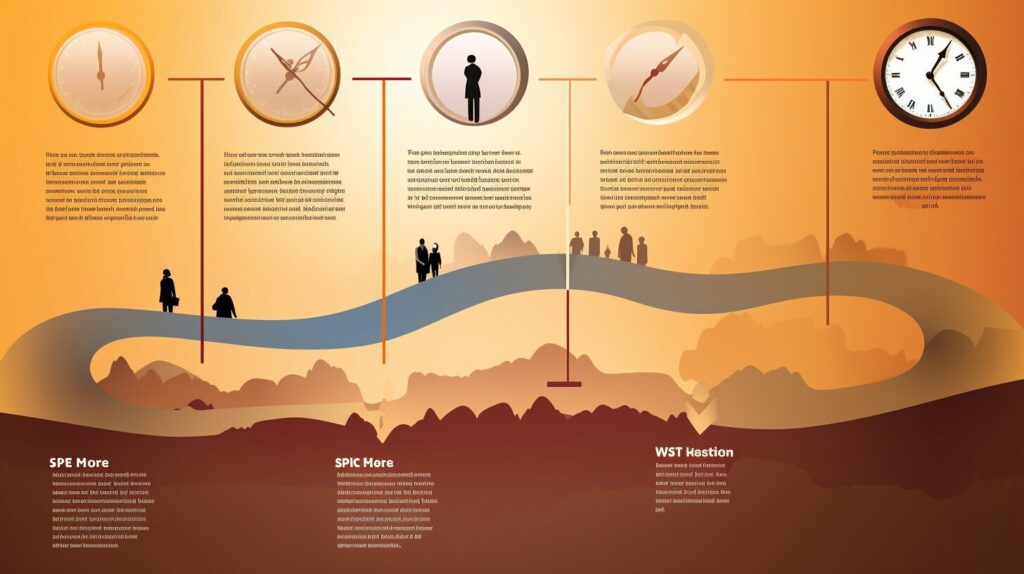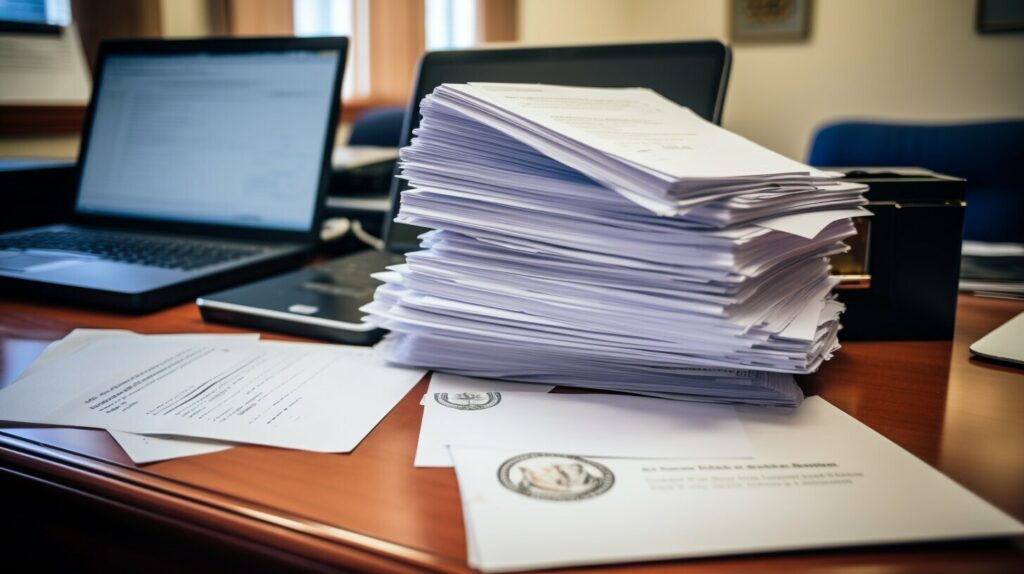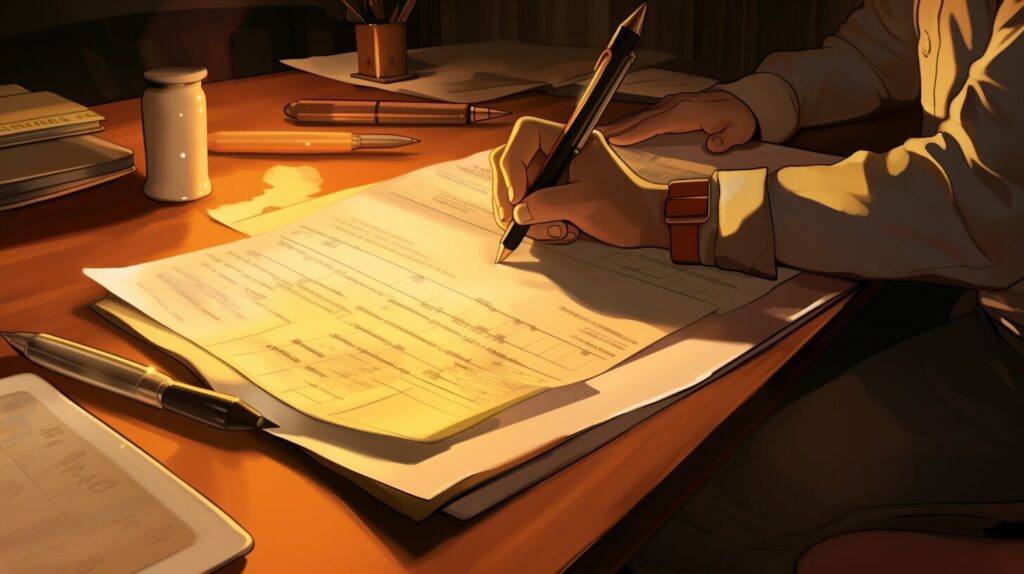Divorce proceedings can be challenging and time-consuming, especially when it comes to paperwork. The preparation of divorce documents is a critical aspect of the entire process, and it’s essential to understand how long it takes to complete it. Several factors can impact the preparation time, and being aware of them can help you streamline the process and minimize delays.
The divorce process involves various legal requirements and paperwork that need to be completed and filed correctly. To ensure everything goes smoothly, it’s crucial to prepare and submit the necessary documents in a timely manner.
So, how long does it take to prepare divorce documents? The answer to this question depends on several factors, such as the complexity of the case, the number of required documents, and finding the right legal representation.
In this article, we will provide you with valuable insights into the process of preparing divorce documents, including the steps involved, the legal requirements, and the factors that can impact the preparation time.

- Understanding the Divorce Process
- Gathering Necessary Documents
- Finding Legal Representation
- Determining the Complexity of the Case
- Researching Local Laws and Regulations
- Drafting and Reviewing Divorce Documents
- Gathering and Submitting Required Divorce Documents to the Court
- Waiting for the Divorce Decree
- Factors Affecting Preparation Time
- Conclusion


Key Takeaways
- Preparing divorce documents is a crucial aspect of the divorce process and requires careful attention.
- The time it takes to prepare divorce documents can vary based on several factors, including the complexity of the case and the number of required documents.
- To minimize delays and ensure a smooth process, it’s essential to understand the legal requirements and find appropriate legal representation.
- Organizing and gathering necessary documents can help streamline the process and reduce the preparation time.
- Completing the paperwork accurately and seeking legal review can help minimize errors and avoid delays in the filing process.
Understanding the Divorce Process
The decision to file for divorce is often a difficult and emotional one. However, it is essential to understand the legal requirements and the process involved in order to make informed decisions and navigate the process smoothly.
The divorce process involves various steps, which can vary depending on the individual circumstances of the case. However, there are some general legal requirements that must be met in order to file for a divorce in the UK.
- Firstly, it is necessary to establish that the marriage has irretrievably broken down. This is the sole ground for divorce in the UK.
- Secondly, it is necessary to prove that the couple has been married for at least one year. There are some exceptions to this rule, such as in cases involving domestic abuse.
- Thirdly, it is necessary to establish that at least one of the spouses has a permanent home in England or Wales, or has lived in England or Wales for at least a year before the divorce petition is filed.
Once these legal requirements are met, the divorce process can begin. The first step is to prepare the necessary paperwork, which includes a divorce petition, a statement of arrangements for any children, and an acknowledgment of service form.
It is essential to ensure that all the required information is included and that the forms are completed correctly. Errors or omissions can lead to delays or even the rejection of the divorce petition, resulting in the need to start the process again.
After the paperwork is completed, it must be filed with the court and served to the other spouse. The spouse then has the opportunity to respond to the petition, either by agreeing to the divorce or by contesting it.
If the divorce is contested, the case will need to go to court, and the judge will make a decision based on the evidence presented by both sides. If the divorce is uncontested, the court will issue a decree nisi, which is a provisional judgment of divorce. After a period of six weeks and one day, the court can issue a decree absolute, which is the final judgment of divorce.
The divorce process can be complex and emotional, and it is essential to seek legal advice and support throughout the process.


Gathering Necessary Documents
When preparing for divorce proceedings, it is essential to gather all required documents to ensure your case is presented accurately and efficiently. Different jurisdictions may have slightly different requirements, so it is important to research and understand the specific requirements in your local area.
Apart from standard information such as full names, identification documents, dates of birth, and contact information, there are specific documents that may be required by the court. These documents are typically related to the assets involved in the marriage, custody arrangements, and financial obligations.
Required Documents
The most commonly required documents are:
| Documentation | Purpose |
|---|---|
| Marriage certificate | Proof of marriage and details of the date and location of the union |
| Financial records | Details about income, expenses, assets, and debts of both parties to determine the division of property and spousal support |
| Child custody agreement | Details about the custody and support of the children involved in the case |
| Property deeds and titles | Proof of ownership and details of the assets involved in the marriage |
| Bank statements and tax returns | Financial information to determine income and expenses for division of property and possibly child support. |
Additional documents may be required depending on the specifics of the case. It is important to consult with a divorce lawyer for guidance on any additional documents needed.
Paperwork Organization
Once you have gathered all the necessary documents, it is important to organize them in a way that is clear and easy to understand. Organizing the documents and paperwork can help speed up the divorce process, reduce confusion and make it easier for the court to review your case.
You can organize your documents in a chronological order or divide them into categories such as financial records, custody agreements, and property deeds. Ensure that each document is labelled clearly and organized sequentially or by category. This can save time and make the process more manageable for you and your lawyer.
Preparing for divorce proceedings can be challenging, but by gathering all necessary documents and organizing your paperwork, you can streamline the process.


Finding Legal Representation
When facing divorce proceedings, it is important to seek legal advice from a qualified divorce lawyer to ensure that all necessary documents are prepared correctly. A divorce lawyer can also provide guidance on navigating the often complex legal requirements of a divorce case.
When selecting a divorce lawyer, it is essential to find someone who has experience and expertise in divorce law. Look for a lawyer who specializes in family law and has a proven track record of success in divorce cases.
It is also important to consider the cost of hiring a divorce lawyer. While legal representation can be expensive, it is crucial not to skimp on legal fees when it comes to something as important as a divorce. Depending on the complexity of the case, a divorce lawyer may be able to provide flat-fee services or work on a contingency basis.
Factors to Consider When Choosing a Divorce Lawyer:
| Factor | Description |
|---|---|
| Experience | Look for a lawyer who has experience in divorce law and family law. |
| Reputation | Check client reviews and ratings to ensure that the lawyer has a good reputation. |
| Cost | Consider the lawyer’s fee structure and how it fits within your budget. |
| Communication | Choose a lawyer who communicates effectively and keeps you informed throughout the process. |
Once a divorce lawyer has been selected, they can assist with preparing the necessary divorce documents. The lawyer can ensure that all required documents are completed accurately and in compliance with local divorce laws and regulations.
It is important to communicate openly and honestly with your lawyer and provide all necessary information. This will help to ensure that the divorce proceedings run as smoothly as possible and that all relevant issues are addressed.


Determining the Complexity of the Case
One of the most significant factors that can affect the preparation time for divorce documents is the complexity of the case. Divorces can be broadly classified into three categories: uncontested, contested, and complex.
Uncontested Divorces
In an uncontested divorce, both parties mutually agree to end the marriage without any disputes. These types of divorces are generally straightforward and require minimal preparation time.
Contested Divorces
On the other hand, in a contested divorce, both parties are unable to reach an agreement on one or more issues, such as child custody, property division, or alimony. These cases typically require more time to prepare, mainly if they involve multiple disputes that need to be resolved in court.
Complex Divorces
Complex divorces involve intricate issues, such as high-value assets, business ownership, and significant debts. These cases can be both contested or uncontested but require a more comprehensive approach to preparing the necessary documents. Because of the complexities involved, these cases may take a longer time to prepare and may require the expertise of a specialised lawyer.
It’s essential to determine the complexity level of the case before beginning the preparation of divorce documents to avoid any delays or potential legal issues. If you’re unsure about the complexity of your case, a divorce lawyer can provide valuable guidance and insight.


Researching Local Laws and Regulations
Understanding the specific divorce laws and regulations in the area where the divorce is being filed is essential to ensuring a smooth process. Jurisdiction is an important factor to consider. Generally, the divorce must be filed in the state or country where either spouse resides.
Local regulations may also affect the divorce process. For example, some areas may have a mandatory waiting period before a divorce can be granted, or require couples to attend mediation sessions before moving forward with the divorce. It is important to research the local regulations and requirements to avoid any unnecessary delays in the process.
| Tip: | Consult with a local divorce lawyer to ensure that you fully understand the laws and regulations in your area. They can provide guidance on any specific requirements or procedures that must be followed. |
|---|
Additionally, if one spouse lives in a different jurisdiction or country, international laws may come into play. This can further complicate the process and it is important to seek legal advice to ensure that all necessary steps are taken.
By researching and understanding the local divorce laws and regulations, individuals can ensure that they are properly prepared for the process and avoid any unexpected delays or issues.


Drafting and Reviewing Divorce Documents
Once all the necessary documents have been gathered, the next step is to begin drafting the divorce documents. It is important to follow the specific legal requirements for the jurisdiction in which the divorce is being filed. This may include using certain forms or including specific language in the documents.
The documents that typically need to be drafted include the petition or complaint for divorce, a marital settlement agreement, and any child custody or support agreements. These documents will outline the terms of the divorce and should be carefully reviewed to ensure that they accurately reflect the wishes and needs of the parties involved.
It is recommended that individuals seek legal advice when drafting these documents to ensure that they meet all the necessary legal requirements and are in their best interests.
During the drafting process, it is important to pay close attention to detail and ensure that all necessary information is included. This may include information about property division, spousal support, and child custody arrangements. The language used in the documents should be clear and concise, avoiding any confusion or ambiguity.
Once the documents have been drafted, they should be reviewed by a legal professional to ensure accuracy and completeness. This can help avoid any issues or delays during the court submission process.
| Tip | Description |
|---|---|
| Organize documents | Keep all documents organized and easily accessible throughout the drafting and review process. |
| Check legal requirements | Be sure to check the specific legal requirements for the jurisdiction in which the divorce is being filed to ensure that the documents meet all necessary criteria. |
| Seek legal review | Have the documents reviewed by a legal professional to ensure accuracy and completeness. |
Overall, the drafting and review process can take several weeks or even months, depending on the complexity of the case and the level of detail involved. However, taking the time to carefully draft and review the divorce documents can help ensure a smoother and more efficient divorce process.


Gathering and Submitting Required Divorce Documents to the Court
After gathering all the necessary documents, the next step is to prepare them for court submission. To ensure a smooth court filing process, it’s important to double-check that all documents are complete, accurate, and in the proper format.
Before submitting the documents to the court, it’s highly recommended to seek legal review to ensure there are no errors or omissions. This can help prevent delays in the processing of the divorce case.
Once the documents are finalized, they can be submitted to the court along with the required fees. The court will then review the documents and either approve or reject them.
If the documents are approved, the court will issue a summons and provide information on the next steps in the process. If the documents are rejected, the court will provide information on what needs to be corrected and resubmitted.
Submitting Divorce Documents to the Court: Checklist
To ensure a smooth court filing process, here’s a checklist to follow when submitting divorce documents to the court:
- Double-check that all documents are complete and accurate
- Make sure all required documents are included
- Verify that all documents are in the correct format and style
- Seek legal review before submitting the documents to the court
- Prepare the required filing fees for submission
- Submit the documents to the appropriate court location
By following this checklist, individuals can help ensure that their divorce documents are properly filed and processed by the court.


“Submitting Divorce Documents to the Court: Checklist”
Waiting for the Divorce Decree
After the divorce documents are submitted to the court, there is a waiting period that typically occurs before the divorce is finalized and the divorce decree is issued. The length of this waiting period can vary depending on a variety of factors.
In some jurisdictions, there is a mandatory waiting period that must pass before the divorce can be finalized. This waiting period can range from a few weeks to several months, depending on the jurisdiction. During this time, the court may review the divorce documents and request additional information or clarification if necessary.
The waiting period can also be affected by the complexity of the divorce case. If the divorce involves disputes over child custody, property division, or other issues, it may take longer for the court to review and finalize the divorce documents. In some cases, the court may require the parties to attend mediation or other alternative dispute resolution methods before finalizing the divorce.
It’s important to note that the waiting period is not always a fixed timeframe and can be extended due to various reasons. For example, if there are errors or inconsistencies in the divorce documents, the court may request revisions, which can further prolong the waiting period. Similarly, if there is a backlog of cases in the court system, the waiting period may be longer than usual.
Overall, the waiting period for the divorce decree can range from a few weeks to several months, depending on the specific circumstances of the divorce. It’s important to be patient during this time and to work closely with your divorce lawyer to address any issues that may arise.


Factors Affecting Preparation Time
Preparing divorce documents can be a complex and time-consuming process, and there are several factors that can affect the timeline. By understanding these preparation factors, individuals can better navigate the divorce timeline and minimize delays.
Complexity of Assets
One factor that can impact the time it takes to prepare divorce documents is the complexity of assets involved. When there are numerous assets to divide, such as properties, investments, and businesses, the paperwork involved can be extensive and require more time to prepare. Additionally, if there are any disputes over these assets, such as disagreements about the valuation of a property, it can further delay the process.
Child Custody Arrangements
If there are children involved in the divorce, determining custody arrangements can also impact the preparation timeline. Negotiating custody agreements can take time and may require input from legal professionals and/or mediators to reach a satisfactory resolution.
Disputes and Contested Divorce
If the divorce is contested and there are disagreements between the parties, it can significantly delay the preparation process. Working through disputes and negotiations can take time, and legal representation may be required to reach a resolution. In some cases, a contested divorce can take months, or even years, to finalize.
Legal Requirements
The legal requirements for divorce can also contribute to the preparation timeline. Meeting the legal requirements for divorce, such as residency requirements and grounds for divorce, can take time to research and gather the necessary documentation.
Attorney Availability
The availability of an attorney can also impact the preparation timeline. If the chosen attorney is in high demand or has a heavy caseload, it may take longer to schedule appointments and receive legal guidance.
Overall Divorce Timeline
Finally, the overall timeline for the divorce can impact the preparation time for divorce documents. If the court has a backlog of cases or there are delays in scheduling court dates, it can prolong the process of submitting and finalizing the divorce documents. Additionally, the waiting period between submitting the documents and receiving the final divorce decree can also vary in length depending on the jurisdiction and other factors.
By understanding these preparation factors, individuals can be better prepared for the divorce timeline and work to minimize delays in preparing divorce documents.


Conclusion
Preparing divorce documents can be a time-consuming and complex process. However, by understanding the divorce process and the legal requirements that must be met, individuals can streamline the preparation time. Gathering necessary documents and finding legal representation are important factors that can affect the timeline.
In addition, the complexity of the case and understanding local laws and regulations can also impact the preparation time. Once the documents are drafted and reviewed, they can be submitted to the court for filing. It is important to note that there may be a waiting period before the divorce decree is issued.
Overall, it is important to approach the divorce process with patience and diligence. By staying organized, seeking legal guidance, and minimizing delays, individuals can navigate the process smoothly. Our guide has provided an overview of the factors that can affect the divorce process and timeline, as well as tips for minimizing complications.
We hope this guide has been informative and helpful for those embarking on the divorce process. Remember, seeking legal advice and following the necessary steps can help make the process as smooth as possible.



FAQ
How long does it take to prepare divorce documents?
The time it takes to prepare divorce documents can vary depending on several factors. These include the complexity of the case, the availability of necessary documents, and the efficiency of the legal representation. It could range from a few weeks to several months.
What is the divorce process?
The divorce process involves several steps, which typically include filing a petition, serving the other party, gathering necessary documents, negotiating settlements, attending court hearings, and, finally, obtaining a divorce decree. The specific process may vary depending on the jurisdiction.
What documents are required for a divorce?
The required documents for a divorce typically include marriage certificates, financial records, tax returns, property titles, and any relevant custody or support agreements. It is important to gather and organize these documents before initiating the divorce proceedings.
Should I hire a divorce lawyer?
Hiring a divorce lawyer is highly recommended as they can provide valuable legal advice and guidance throughout the process. They can help ensure that all necessary documents are prepared correctly, represent your interests in negotiations, and navigate the legal complexities of divorce.
What is the difference between a contested and uncontested divorce?
In a contested divorce, the parties are unable to reach an agreement on one or more significant issues, such as child custody, division of assets, or spousal support. An uncontested divorce, on the other hand, occurs when both parties are in agreement on all aspects of the divorce. The complexity of the case can affect the time it takes to prepare divorce documents.
How do I research local divorce laws and regulations?
Researching local divorce laws and regulations can be done by consulting the relevant statutes and regulations governing divorce in your jurisdiction. It is also advisable to seek guidance from a local divorce lawyer who has expertise in the specific laws and practices of your area.
Do I need to have my divorce documents reviewed by a lawyer?
It is highly recommended to have your divorce documents reviewed by a lawyer before submission. Legal review ensures the accuracy of the documents, helps identify potential issues, and can prevent costly mistakes that may delay the divorce process.
How do I submit my divorce documents to the court?
Submitting divorce documents to the court typically involves filing them with the appropriate court clerk, along with any necessary fees. The specific procedures and requirements for submission may vary depending on your jurisdiction. It is advisable to consult the court’s website or seek legal assistance for guidance.
How long do I have to wait for the divorce decree?
The waiting period for a divorce decree varies depending on the jurisdiction and the specific circumstances of the case. It could range from a few weeks to several months. Factors that can affect the waiting period include the court’s caseload, any required waiting periods mandated by law, and the complexity of the case.
What factors can affect the preparation time for divorce documents?
There are several factors that can impact the time it takes to prepare divorce documents. These include the complexity of the case, the availability of necessary documents, the cooperation of both parties, disputes over child custody or asset division, and any legal or procedural delays that may arise. Taking proactive steps to address these factors can help minimize delays.





Leave a Reply